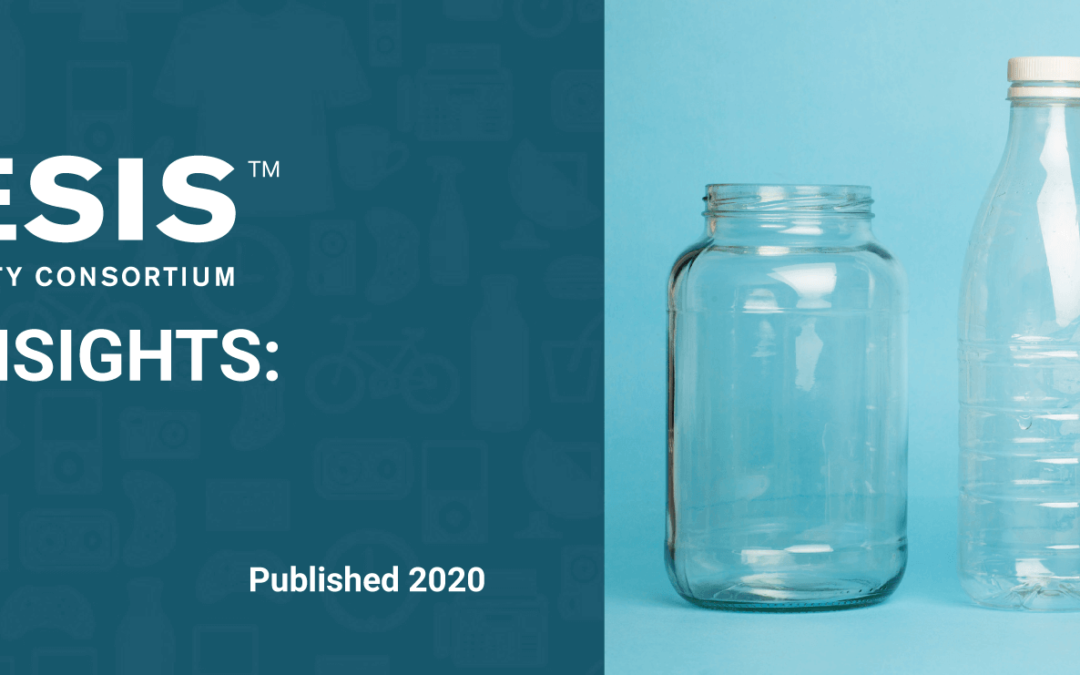The Sustainability Consortium (TSC) released today the THESIS Industry Insights: Packaging report using data from TSC’s The Sustainability Insight System (THESIS). This report is the first report in an ongoing series aimed at using THESIS’ unique data set to raise awareness of key challenges and opportunities in creating more sustainable products. These free reports are released to TSC members first and then made available for the general public. THESIS data highlights two key ways that companies are creating more sustainable product packaging: designing out packaging waste and choosing more materials and formats that are recyclable.
Packaging is an essential element in most consumer products. It protects the product and provides a platform for information and marketing to reach the consumer. When assessing environmental hotspots within a product’s life cycle, packaging is more likely to be relevant than not. For example, most food and beverage products contain packaging. In the U.S. however most packaging gets landfilled, even when it is recyclable. Because of this, consumer goods companies are increasingly adopting new packaging designs to be more sustainable.
TSC’s THESIS defines sustainable packaging as packaging that has recycled content or contains sustainably sourced materials and that can be reused or recycled after use. For example, in 2019, the manufacturers of soft drinks had as a sector 34% post-consumer recycled content and 17% sustainably sourced content. Soft drinks come in a variety of materials – plastic, metal, and glass. Conversely, dessert and pastry products, which use plastic and paper primarily as packaging, has on average the same amount of recycled content (32%) as soft drink packaging, but contains more sustainably sourced material (30%) because of its paper content. THESIS data also showed an increasing number of brands communicating to consumers about sustainability attributes on-package.
Jessica Ginger, TSC’s senior director, TSC Impact, states, “Companies are working hard to create a visionary world where we all benefit from consumer goods without creating harm to people or the planet. Our THESIS Industry Insights will help companies target their time and resource investments by understanding how their industry is progressing and where the challenges remain.”
The data from this industry insights report represents 36 product manufacturers. This free report is available for download here. TSC will be releasing similar reports throughout the year. TSC translates the best sustainability science into business tools that are used all over the world to create more sustainable consumer products.
About TSC
The Sustainability Consortium (TSC) is a global non-profit organization transforming the consumer goods industry to deliver more sustainable consumer products. We work to enable a world where people can lead fulfilled lives in a way that decouples their impacts on people and the planet. Our members and partners include manufacturers, retailers, suppliers, service providers, NGOs, civil society organizations, governmental agencies and academics. TSC convenes our diverse stakeholders to work collaboratively to build science-based decision tools and solutions that address sustainability issues that are materially important throughout a product’s supply chain and lifecycle. TSC also offers a portfolio of services to help drive effective improvement and implementation. Formed in 2009, TSC is jointly administered by Arizona State University and the University of Arkansas and has a European office at Wageningen University and Research in the Netherlands. For more information visit www.sustainabilityconsortium.org.
Media Inquiries:
Erika Ferrin
The Sustainability Consortium
[email protected]
480-965-7752

